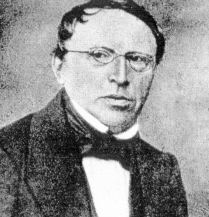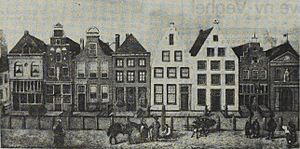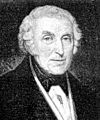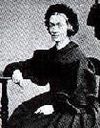Lion Philips facts for kids
Quick facts for kids
Lion Philips
|
|
|---|---|
 |
|
| Born | October 29, 1794 |
| Died | December 28, 1866 (aged 72) |
| Nationality | Dutch |
| Occupation | Tobacco merchant |
| Known for | Supporting Karl Marx |
| Spouse(s) | Sophie Pressburg |
| Children | Frederik Philips |
| Parent(s) | Benjamin Philips Lea Hartog |
| Relatives | Nanette Salomons Cohen (mother-in-law) Henriette Pressburg (sister-in-law) Karl Marx (nephew) Anton Philips (grandson) Gerard Philips (grandson) |
Lion Philips (born October 29, 1794 – died December 28, 1866) was a Dutch businessman. He was a tobacco merchant. He is also famous for being the grandfather of Gerard Philips and Anton Philips. They founded the well-known company Philips Electronics. Lion Philips was also a financial supporter of the famous thinker Karl Marx.
Contents
Lion Philips's Early Life and Family
Lion Philips was born in Zaltbommel, a town in the Netherlands. His parents, Benjamin Philips and Lea Hartog, had moved there from another town called Veenendaal. Lion was the oldest of nine children in his family. He had seven brothers and two sisters.
Most of his brothers and sisters moved to different places around the world. They did this to help their family businesses grow. But Lion decided to stay in Zaltbommel.
Marriage and Famous Relatives
Lion Philips married Sophie Pressburg. She was from Nijmegen, another Dutch city. Sophie had a sister named Henriëtte Pressburg. Henriëtte married a German lawyer named Heinrich Marx. They became the parents of Karl Marx, a very important thinker. This means that Karl Marx was Lion Philips's nephew!
Lion and Sophie Philips had nine children together. One of their sons was Frederik Philips. Frederik later started a company with his own son, Gerard Philips. This company was called Philips Electronics. It was the first Dutch company to make light bulbs. Gerard's younger brother, Anton Philips, joined the company later.
Lion Philips's Business Career
In 1815, Lion Philips started a tobacco company. He partnered with a man named Gerlacus Ribbius Peletier. Their company was called "The Unicorn." This tobacco business continued for many years. It stayed active until the late 1900s.
Besides selling tobacco, Lion Philips also had other businesses. He owned a factory that made blankets, but it later burned down. When he passed away in 1866, his wealth was estimated to be about 189,000 Dutch guilders. This was a large sum of money back then.
Lion Philips and Karl Marx
Karl Marx and Lion Philips had a very close relationship. Marx often visited the Philips family. He stayed with them in Nijmegen and later in Zaltbommel. We know of several letters they wrote to each other. These letters discussed many different topics. They talked about things like the American Civil War and the discovery of electricity.
A big reason for their close connection was money. Lion Philips was Karl Marx's main financial supporter. He also helped manage money matters between Marx and his mother, Henriëtte. Marx and his mother did not get along well. Marx once wrote that he had "fallen out with my family." He also said he had no right to his inheritance while his mother was alive.
Because of this, Lion Philips gave Marx money. First, he gave Marx money from his father's inheritance. Later, he gave Marx advances from his mother Henriëtte's future inheritance.
After Henriëtte passed away in 1863, Lion was one of the people in charge of her will. He paid Karl Marx what was left of his inheritance. It was a significant amount of seven thousand guilders. Lion also sometimes gave Marx extra money. Marx once wrote to his friend Friedrich Engels, "I squeezed £160 out of my uncle." This shows how Lion Philips helped him with money.
Karl Marx found a "hospitable home" with Lion Philips and his family. He also enjoyed having "intellectual discussions" with them.
 | James B. Knighten |
 | Azellia White |
 | Willa Brown |




